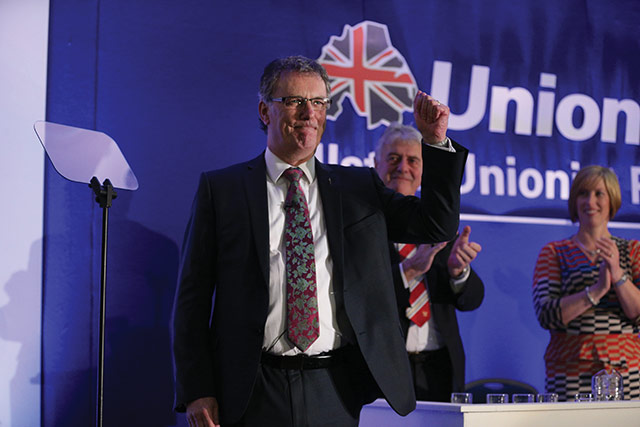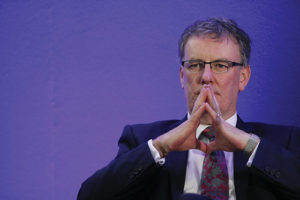An opposing voice

UUP leader Mike Nesbitt talks to David Whelan about his decision to lead his party into official opposition, describing it as a more transparent, easily understood and honest way of doing business, all the while unshackling his MLAs from the Assembly’s collective responsibility to constructively scrutinise.
Two days into discussions on the draft Programme for Government framework, Mike Nesbitt walked his party away from the table and in doing so declared that Northern Ireland was to have its first official opposition since the signing of the Good Friday Agreement in 1998.
“For the last nine years the Executive has been led, dominated and bossed by the DUP and Sinn Féin but because other parties had at least a seat at the table, they were sucked in. When anything went wrong there was a collective responsibility, a defence used by the bigger parties,” he says.
Once the largest party in Northern Ireland, the UUP has suffered a fall from power and successive difficult elections since the resumption of power-sharing in 2007 and a major reduction in its electoral mandate. The 16 MLAs elected in May represented no change in number from the previous election in 2011. It entitled the party to a place on the Executive but Nesbitt believed the time was right to step away from the structure of power-sharing.
“There was a very unsatisfactory sense of being half in and half out of government if you were one of the smaller parties,” he added. “By coming out and leaving the DUP and Sinn Féin as themselves alone, you have a much more transparent, easily understood and in a sense a more honest way of doing business because if the Executive make an announcement, it is a DUP/Sinn Féin announcement. We are unshackled from that collective responsibility and we can do our thing, which will be to scrutinise.” Nesbitt says that he did not see scrutinising and criticising as the same function, stressing that as the opposition he would support the Executive where possible.
Segregation and division was one of, if not the main factor, in the formation of the structure of government in Northern Ireland. The peace process required all of the major parties to take a share of power through d’Hondt. In effect the system was tailored to suit Northern Ireland’s unique situation. That system was challenged by former UUP MLA John McCallister prior to this year’s election through the introduction of the Assembly and Executive Reform (Assembly Opposition) Bill. Its basis lay in the opposition functions operating in the Dáil and at Westminster. On announcing his party’s move into opposition previously, Nesbitt described it as “a big, bold step forward to normal democracy”, seemingly agreeing that Stormont’s institutions had matured enough to take the strain of change.
 “What the architects of the agreement in 1998 were trying to achieve was to bring everyone into the political tent. Eighteen years ago you had people who did want to go forward politically, you had a second group who thought violence was the way to achieve change and then you had a third group who wanted to ride those two horses. The primary objective was to get all those three groups to Stormont and committed to using politics,” said Nesbitt. “By definition that means effective and efficient government was not the primary objective, getting everyone into the big tent or getting them a slice of the big cake was. Eighteen years on, these institutions are not going away. Everyone who was going to buy into politics has bought in.
“What the architects of the agreement in 1998 were trying to achieve was to bring everyone into the political tent. Eighteen years ago you had people who did want to go forward politically, you had a second group who thought violence was the way to achieve change and then you had a third group who wanted to ride those two horses. The primary objective was to get all those three groups to Stormont and committed to using politics,” said Nesbitt. “By definition that means effective and efficient government was not the primary objective, getting everyone into the big tent or getting them a slice of the big cake was. Eighteen years on, these institutions are not going away. Everyone who was going to buy into politics has bought in.
“We’ve got the Government, an Executive and an Assembly but it’s not delivering. The emphasis now is on effective and efficient government. To achieve that we believe the mature next step was to set up an official opposition. Clearly we would rather it was the DUP in that opposition but the electorate spoke on May 5 and they said they wanted the DUP to lead the government and they wanted Sinn Féin. As in any normal democracy, when the people speak you get a government and those who didn’t get the votes to form the government go into opposition. The only thing that makes us different from the other (political) institutions is that there would always have to be, in our view, a cross-community government.”
However, operating the same system of government in Northern Ireland that has seen both leaders of opposition parties in the Republic of Ireland and Britain become Taoiseach and Prime Minister respectively will not prove as simple as it sounds. On celebrating the passing of the Opposition Bill, McCallister admitted that it lacked reform of Executive functions, introduction of collective cabinet responsibility, as well as the removal of community designations and petitions of concern, which he had originally included.
Nesbitt admits that both Sinn Féin and the DUP will hold almost all the chips when it comes to creating and passing legislation for the next five years. Asked where he believed the UUP’s power lay in opposition, he says: “We can highlight why we think it is the wrong thing to do or not the best thing to do, which is what an opposition does. Initially that should happen in the chamber because the minister should come to the house and say ‘here is the proposal’ and we will have the opportunity to stand up as the official opposition and make a response to that, as well as through the media and through our own internal chats.”
The main change to the working of the new Assembly to accommodate official opposition will be to speaking rights. Nesbitt explains that where previously the Chair of the Committee followed the relevant minister in speaking, the official opposition will now become the secondary speaker. Opposition will also be given the first slot in the topical question section timeframe, a 15 minute slot which follows the 30 minutes set aside for submitted questions to the minister. There will also be opposition debates, however, earlier this month Sinn Féin and the DUP opted to replace a slot for opposition-tabled debates every second week to an unspecified number of opposition days.
Critics of the UUP have accused them of ignoring an electoral mandate handed to the public to enter the Executive. However, Nesbitt is confident that the party set out its position clearly within its manifesto. “We were clear right through that we were seeking a mandate to enter negotiations on the Programme for Government, not to go into the Executive. There were two tests we set to apply. The first was whether it was a progressive programme and the second was to sense whether Sinn Féin and the DUP wanted other parties around the table. We went into those talks expecting them to last a fortnight but it was clear after two days that the Programme for Government wouldn’t have a draft until the autumn and wouldn’t be finalised until the end of the year. We also got a very clear sense that Arlene Foster would be very happy not to have the UUP at the table.”
Highlighting that his party withdrew from the Executive just under a year ago and prior to planning and workshops on the new Programme for Government, he added: “You have to make a decision on opposition by the end of June, according to legislation, so that would proceed the publication of even the draft Programme for Government. Is it a progressive programme? We can’t say it is because we haven’t even seen it yet.”
Despite his criticism of the timeframe surrounding the programme, the former journalist appeared to support the ‘outcomes based’ format the programme has taken and said that it was something he himself had promoted during the last mandate.
“We are obsessed with the inputs of government and what we need to do is look at the other side in the outputs and the outcomes. If that is what it ends up then that’s great. But currently the framework says we want more higher paid job, well who is putting their hands up for fewer less well paid jobs? High class public services, who wants low class public services? Younger healthier lives, well who wants people to die off young? It is at the motherhood and apple pie stage. Down the line if you put some flesh and bones on it, it may actually develop into something you could support. I’m sure in the final programme there will be things that we can support because I would be amazed if there isn’t a real push for (improved) mental health and wellbeing.”
Looking towards the future Nesbitt says that key policy areas in which he hopes his party could influence as opposition would include improving mental health in Northern Ireland, tackling educational under achievement and the level of poverty. He is all too aware though that a partnership with the SDLP in opposition would strengthen his party’s case as a credible alternative to the current government.
“It would appear from John McCallister’s Bill that I am opposition leader but I am really not hung up about titles. I am the leader of the Ulster Unionist Party, we are the biggest party of opposition but what I am concerned about is that we are an effective party of opposition. The other big role that we will have increasingly as we go through the mandate is to convince the public that we offer a credible alternative and on that basis, that’s maybe where you would want to be working in a partnership and in an understanding with the SDLP. We’ve had initial discussions with the SDLP and these things are fluid. We’re not that far from summer recess and certainly I don’t feel that that is a deadline by which we have to get things done, in saying that if there are agreements that can be reached tomorrow I see no reason to hang about.”
Nesbitt says that the finer details of how a coalition opposition would operate form part of their discussions with the SDLP but he would not be drawn on whether he sees official opposition as a mainstay in Northern Ireland politics given that all qualifying parties would still be entitled to take up their seats in an Executive.
“That’s speculation for another day. What we are focused on at the moment is that we have 16 MLAs, eight of whom are new. It’s very early days in the mandate so we want to get them as efficient and as effective as possible. We’ve got off to a great start, we want to focus on how best we achieve opposition. We are finding out what works well and what doesn’t. We are taking our time to see to what extent we can form a relationship, possibly even a partnership with the SDLP. So to talk about what happens if you’re the biggest party in 2021, is so far away it’s not on the agenda. I would very much hope that we wouldn’t be in the position of having to be the official opposition in 2021 but it will hopefully be a question for somebody else.”





